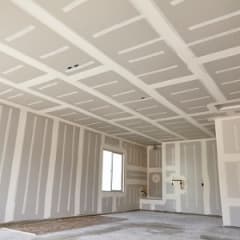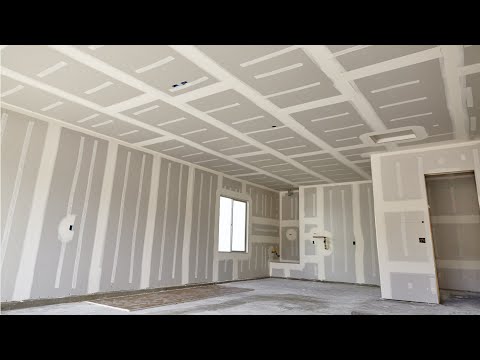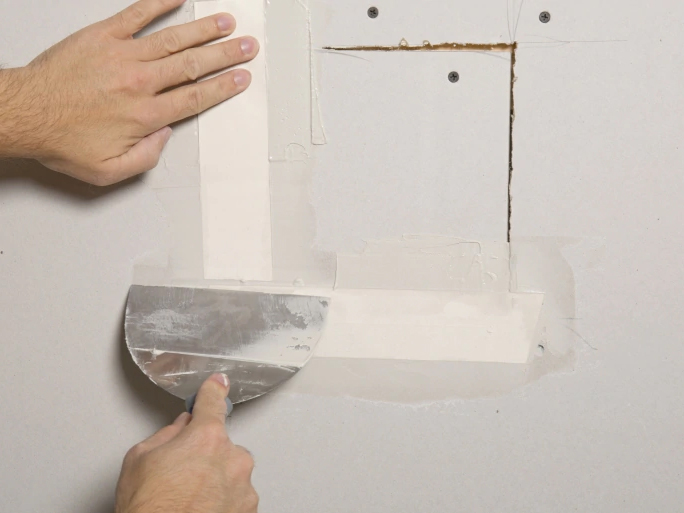
When attaching drywall to concrete, there are a few things to keep in mind. This will save you time and prevent problems. Foam board adhesive is a good choice if you are trying to attach drywall to concrete blocks. It will keep moisture out of the walls. A professional is the best option if you aren't sure what to do.
First, make sure your concrete is clean and properly filled. You'll also need to seal the area. Installing drywall over concrete requires several tools. These tools include an air hose and a caulk gun. Work requires the use of a dust mask, goggles, and safety glasses.
Next, you will need to install furring strips. Furring strips are long, 1-inch-thick wood strips that act as a frame for the drywall. These can be attached to concrete by either gluing or screwing them. After the concrete has been poured, attach the drywall to the furring strip.

Once the drywall has been hung on the furring strips, you'll need to fill any gaps between the drywall and the furring strips. These should be filled with masonry primer. You can also use mesh drywall tape as a barrier to water infiltration. You can also use tarpaper to prevent moisture from entering the gaps.
During the drywall installation process, you should always work on one sheet at a time. Sometimes, you will need to use a sander for smoothing the concrete and drywall joints. For finishing the seams you should use either a 6-inch or 5-inch drywall blade.
Once the drywall is installed, you can give it a primer coat. You can paint the drywall once the primer is dry. You'll need to sand it before you apply the paint.
Finally, it is a good idea use a vapour barrier to seal your walls. Concrete absorbs water like a sponge. Moisture transfers can damage drywall and lead to mold growth. A plastic moisture shield will prevent moisture from passing through.

You'll also need the right tools to install drywall over concrete. There are many tools you will need: a utility knife and saw horse, hammer drill and an air compressor. While working, it is important to wear gloves and a mask.
Drywall is also susceptible to cracking when it is attached to concrete. If you attach the drywall directly to concrete, your drywall is at greater risk of mildew and cracking. To minimize this, install the drywall over a moisture-proof barrier wall.
While you can hang drywall above concrete, it's not recommended. Some cases will make it difficult to remove the drywall glue. Other situations will require you to patch the holes. In the end, it may take hours to fix the concrete to the drywall. If you follow the correct methods, you can hang drywall on top of a concrete block.
FAQ
How do you choose a good contractor to work with?
When choosing a contractor, ask friends and family members for recommendations. Check out online reviews. Make sure that the contractor you choose has experience in the area of construction that you are interested in. Refer to previous clients and verify their references.
What order should renovations of the home be performed?
You must decide where everything will go when you renovate your home. You should consider how you want to market your home to potential buyers if you are planning to sell your house soon. Next, think about how you want your living space, including the kitchen, bathroom and living room. Once you have chosen the rooms you want to remodel, you can start looking for contractors who can help you. Once you have hired contractors, you can start working on your remodeling project.
How can I avoid being taken advantage of when I renovate my house?
Knowing what you're paying for is the best way to avoid being scammed. Be sure to read the fine print before you sign any contract. Do not sign unsigned contracts. Always request copies of signed contracts.
Do you prefer to hire a general contractor, or a subcontractor for your project?
Hiring a general contractor is usually more expensive than hiring a subcontractor. A general contractor has many employees, so they often charge their clients a lot of money for labor costs. A subcontractor on the other side only employs one person, so he/she charges less per-hour.
Should you do floors or walls first?
The best way to start any project is by deciding on what you want to achieve. It is essential to consider how the space will be used, who will use it, and why. This will help to decide whether flooring or wall coverings is best for you.
Flooring may be an option if you are planning to make an open kitchen/living room. You could also consider wall coverings for privacy if this is the space you are looking to create.
Are permits required to renovate my home?
Yes, you will need permits before starting any home improvement project. You will require a building permit as well as a plumbing permit in most cases. A zoning permit may be required depending on what type of construction you are doing.
Can you live in a house during renovation?
Yes, I can live inside a house while I renovate it.
You can live in a house that is being renovated while you are renovating it. The time taken to complete the work will impact the answer. If the renovation process lasts less than 2 months, then yes, you can live in your home while it's under construction. You can't live there if your renovation project takes more than two months.
You should not live in your house while there is a major building project underway. This is because you could be injured or even killed by falling objects on the construction site. The heavy machinery and noise pollution at the job site can also cause dust and noise pollution.
This is especially true if your house has multiple stories. If this happens, the sound and vibration caused by the construction workers can cause significant damage to your home and contents.
As I mentioned before, while your home is being remodeled, you'll have to manage the inconveniences of living in temporary shelters. This means that you won't have access to all the amenities that come with your own home.
You won't be allowed to use your dryer or washing machine while they are being repaired. It will be difficult to bear the smell of paint fumes as well the sounds that workers make.
All these things can lead to anxiety and stress in your family. So it is important that you plan ahead so you don't feel overwhelmed by all the circumstances.
To avoid costly mistakes, do your homework before you make any decisions about renovating your home.
Also, it is a good idea to get professional help from a reputable contractor in order for everything to go smoothly.
Statistics
- A final payment of, say, 5% to 10% will be due when the space is livable and usable (your contract probably will say "substantial completion"). (kiplinger.com)
- They'll usually lend up to 90% of your home's "as-completed" value, but no more than $424,100 in most locales or $636,150 in high-cost areas. (kiplinger.com)
- Most lenders will lend you up to 75% or 80% of the appraised value of your home, but some will go higher. (kiplinger.com)
- Design-builders may ask for a down payment of up to 25% or 33% of the job cost, says the NARI. (kiplinger.com)
- The average fixed rate for a home-equity loan was recently 5.27%, and the average variable rate for a HELOC was 5.49%, according to Bankrate.com. (kiplinger.com)
External Links
How To
Five Things You Need to Know Before You Begin Your Home Renovation
-
Do you really want this? If you are planning to do major home improvements like renovating your bathroom or building new houses, you will likely need help. You might reconsider if you're not confident enough to handle such a huge task on your own. It could take up a lot of your time and money, and you won't get any real benefits from it. Instead, hire someone who has experience in this field to assist you. They'll save your time and make it easy for you to have a wonderful place to call home.
-
How much should a project cost? This may seem obvious but it could make things worse if you spend too much on your renovation project. It's because you'll most likely be responsible for paying back the majority of the costs. If you have a budget in place, stick with it. If you don't, you might end up spending a lot of money and not receiving anything.
-
Should I use DIY or hire professionals? - There is no right or incorrect answer. However, we recommend hiring professional tradespeople when you can afford them. They can give you sound advice about how to proceed with your project. They will be able to install the plumbing properly, make sure everything is safe, and give you a warranty after they are done. DIY projects require lots of trial and errors, which can mean you'll have many lessons to learn. You'll also have to deal with any problems that may arise throughout the process.
-
How much can I afford it? - Don't underestimate what a renovation will cost. You might need to borrow money from family and friends to pay the bills. And if you're planning to sell your current property soon after completing the renovations, you'll definitely need to factor in the price of selling it into your calculations.
-
Where should I begin? There's no right or incorrect place when it comes down to where to start. We suggest you choose something you like to do. It will motivate you to work harder and reduce procrastination. You should also avoid areas that require extensive maintenance. You should avoid redecorating your living room if it is always covered in dirt and dust.